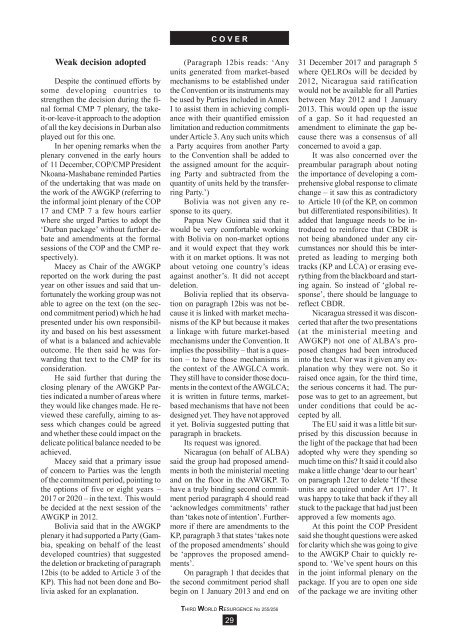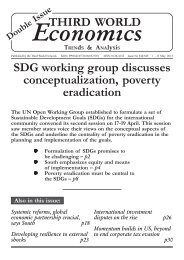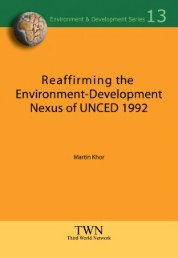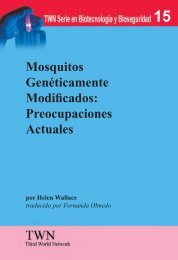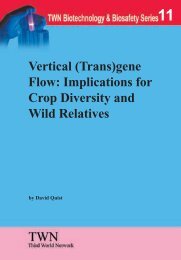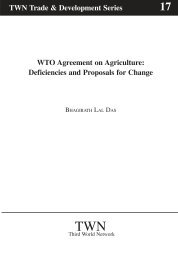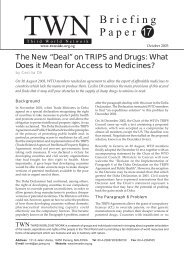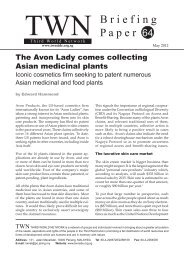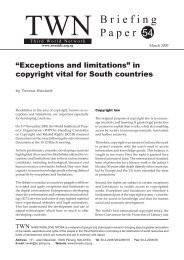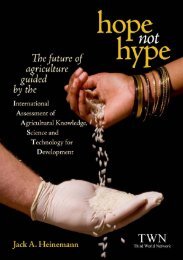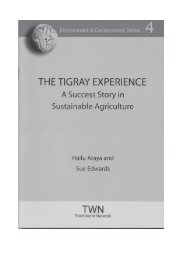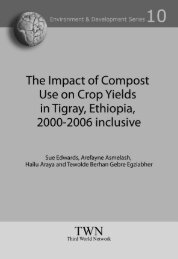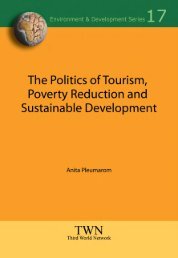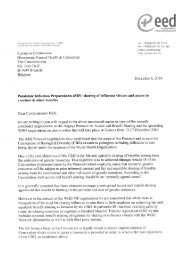Download - Third World Network
Download - Third World Network
Download - Third World Network
You also want an ePaper? Increase the reach of your titles
YUMPU automatically turns print PDFs into web optimized ePapers that Google loves.
C O V E R<br />
Weak decision adopted<br />
Despite the continued efforts by<br />
some developing countries to<br />
strengthen the decision during the final<br />
formal CMP 7 plenary, the takeit-or-leave-it<br />
approach to the adoption<br />
of all the key decisions in Durban also<br />
played out for this one.<br />
In her opening remarks when the<br />
plenary convened in the early hours<br />
of 11 December, COP/CMP President<br />
Nkoana-Mashabane reminded Parties<br />
of the undertaking that was made on<br />
the work of the AWGKP (referring to<br />
the informal joint plenary of the COP<br />
17 and CMP 7 a few hours earlier<br />
where she urged Parties to adopt the<br />
‘Durban package’ without further debate<br />
and amendments at the formal<br />
sessions of the COP and the CMP respectively).<br />
Macey as Chair of the AWGKP<br />
reported on the work during the past<br />
year on other issues and said that unfortunately<br />
the working group was not<br />
able to agree on the text (on the second<br />
commitment period) which he had<br />
presented under his own responsibility<br />
and based on his best assessment<br />
of what is a balanced and achievable<br />
outcome. He then said he was forwarding<br />
that text to the CMP for its<br />
consideration.<br />
He said further that during the<br />
closing plenary of the AWGKP Parties<br />
indicated a number of areas where<br />
they would like changes made. He reviewed<br />
these carefully, aiming to assess<br />
which changes could be agreed<br />
and whether these could impact on the<br />
delicate political balance needed to be<br />
achieved.<br />
Macey said that a primary issue<br />
of concern to Parties was the length<br />
of the commitment period, pointing to<br />
the options of five or eight years –<br />
2017 or 2020 – in the text. This would<br />
be decided at the next session of the<br />
AWGKP in 2012.<br />
Bolivia said that in the AWGKP<br />
plenary it had supported a Party (Gambia,<br />
speaking on behalf of the least<br />
developed countries) that suggested<br />
the deletion or bracketing of paragraph<br />
12bis (to be added to Article 3 of the<br />
KP). This had not been done and Bolivia<br />
asked for an explanation.<br />
(Paragraph 12bis reads: ‘Any<br />
units generated from market-based<br />
mechanisms to be established under<br />
the Convention or its instruments may<br />
be used by Parties included in Annex<br />
I to assist them in achieving compliance<br />
with their quantified emission<br />
limitation and reduction commitments<br />
under Article 3. Any such units which<br />
a Party acquires from another Party<br />
to the Convention shall be added to<br />
the assigned amount for the acquiring<br />
Party and subtracted from the<br />
quantity of units held by the transferring<br />
Party.’)<br />
Bolivia was not given any response<br />
to its query.<br />
Papua New Guinea said that it<br />
would be very comfortable working<br />
with Bolivia on non-market options<br />
and it would expect that they work<br />
with it on market options. It was not<br />
about vetoing one country’s ideas<br />
against another’s. It did not accept<br />
deletion.<br />
Bolivia replied that its observation<br />
on paragraph 12bis was not because<br />
it is linked with market mechanisms<br />
of the KP but because it makes<br />
a linkage with future market-based<br />
mechanisms under the Convention. It<br />
implies the possibility – that is a question<br />
– to have those mechanisms in<br />
the context of the AWGLCA work.<br />
They still have to consider those documents<br />
in the context of the AWGLCA;<br />
it is written in future terms, marketbased<br />
mechanisms that have not been<br />
designed yet. They have not approved<br />
it yet. Bolivia suggested putting that<br />
paragraph in brackets.<br />
Its request was ignored.<br />
Nicaragua (on behalf of ALBA)<br />
said the group had proposed amendments<br />
in both the ministerial meeting<br />
and on the floor in the AWGKP. To<br />
have a truly binding second commitment<br />
period paragraph 4 should read<br />
‘acknowledges commitments’ rather<br />
than ‘takes note of intention’. Furthermore<br />
if there are amendments to the<br />
KP, paragraph 3 that states ‘takes note<br />
of the proposed amendments’ should<br />
be ‘approves the proposed amendments’.<br />
On paragraph 1 that decides that<br />
the second commitment period shall<br />
begin on 1 January 2013 and end on<br />
31 December 2017 and paragraph 5<br />
where QELROs will be decided by<br />
2012, Nicaragua said ratification<br />
would not be available for all Parties<br />
between May 2012 and 1 January<br />
2013. This would open up the issue<br />
of a gap. So it had requested an<br />
amendment to eliminate the gap because<br />
there was a consensus of all<br />
concerned to avoid a gap.<br />
It was also concerned over the<br />
preambular paragraph about noting<br />
the importance of developing a comprehensive<br />
global response to climate<br />
change – it saw this as contradictory<br />
to Article 10 (of the KP, on common<br />
but differentiated responsibilities). It<br />
added that language needs to be introduced<br />
to reinforce that CBDR is<br />
not being abandoned under any circumstances<br />
nor should this be interpreted<br />
as leading to merging both<br />
tracks (KP and LCA) or erasing everything<br />
from the blackboard and starting<br />
again. So instead of ‘global response’,<br />
there should be language to<br />
reflect CBDR.<br />
Nicaragua stressed it was disconcerted<br />
that after the two presentations<br />
(at the ministerial meeting and<br />
AWGKP) not one of ALBA’s proposed<br />
changes had been introduced<br />
into the text. Nor was it given any explanation<br />
why they were not. So it<br />
raised once again, for the third time,<br />
the serious concerns it had. The purpose<br />
was to get to an agreement, but<br />
under conditions that could be accepted<br />
by all.<br />
The EU said it was a little bit surprised<br />
by this discussion because in<br />
the light of the package that had been<br />
adopted why were they spending so<br />
much time on this? It said it could also<br />
make a little change ‘dear to our heart’<br />
on paragraph 12ter to delete ‘If these<br />
units are acquired under Art 17’. It<br />
was happy to take that back if they all<br />
stuck to the package that had just been<br />
approved a few moments ago.<br />
At this point the COP President<br />
said she thought questions were asked<br />
for clarity which she was going to give<br />
to the AWGKP Chair to quickly respond<br />
to. ‘We’ve spent hours on this<br />
in the joint informal plenary on the<br />
package. If you are to open one side<br />
of the package we are inviting other<br />
THIRD WORLD RESURGENCE No 255/256<br />
29


